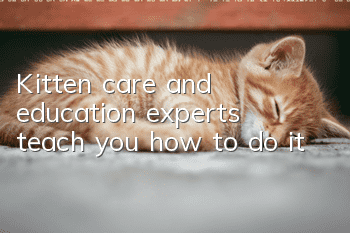Kitten care and education experts teach you how to do it

Cats are very important in their early childhood. If they want them to have a healthy body, their owners need to be patient and careful, and take good care of them in terms of diet and other aspects. At the same time, if you want your cat to have good living habits, you must start training it when it is young. Cats in this period are the easiest to teach.
1. How to feed cats without teeth
1. Nutritious breastfeeding
Before cats have teeth, they are fed through breast milk. Ensuring high nutrition and good health of the mother cat is also an important condition for protecting the health of the kittens and promoting their healthy growth.
2. The preferred liquid for weaning
After a cat is weaned before teeth grow, the first choice of food is liquid food, which can be drank directly. It is easily absorbed in the intestines and stomach and will not cause gastrointestinal burden. The liquid food consumed by cats should be specially formulated with dairy products.
Milk that humans drink must not be given to cats.
3. Soak kitten food
When a cat grows up day by day, although its teeth have not yet grown in, ordinary liquid food can no longer meet the cat’s nutritional needs. You can choose young cat food, soak it in warm water until soft, and then give it to the young cat.
The soaking water temperature should be around 40 degrees Celsius and soaked for 30 minutes before consumption.
4. Calcium powder and vitamins
Calcium powder and vitamins can also be appropriately added to the food of cats without teeth, which can meet the cat’s calcium needs for bone growth. At the same time, vitamins can also enhance the cat’s resistance.
There are tricks to training cats to be obedient!
2. Life care and care of kittens
1. Soothe the kittens
To avoid noisy environments, owners can gently hold the kitten to calm its nervous mood. When a cat is in a safe environment, it will relax its vigilance. After a few days when it is familiar with the new environment, the cat will have fun with its owner.
2. Eat a healthy and rich diet
Kittens are in a critical period of growth. At this time, the cat's bone development is not yet complete, its metabolic function is slightly weak, and its absorption and digestion functions also need to be improved. The food prepared for kittens should be nutritious and easy to digest and absorb.
3. Prepare fresh drinking water
Prepare fresh drinking water for cats. Calcium powder or vitamin C can be appropriately added to the kitten’s food, mainly to promote the kitten’s bone development and growth and also enhance the kitten’s physical resistance.
It should be fed with small amounts and frequent meals, preferably 3-4 times a day.
4. Clean according to life cycle
Therefore, the cat’s bathing cycle can be appropriately extended.Especially for kittens, the bathing cycle can be every 15-30 days. The specific time can be determined based on the cat’s activity cycle and body cleanliness.
5. There is no benefit to bathing frequently
Cats should not be bathed frequently, as this is not good for the kitten’s skin and hair. Owners can comb their cats' hair every day, simply clean the dirt on their hair, and keep their cats' bodies clean.
6. Keep the food bowl clean
Cat’s litter boxes, food bowls, drinking vessels, etc. also need to be cleaned regularly to ensure that cats have a clean and comfortable resting environment so that kittens can grow up healthily.
7. Cats should exercise appropriately
Cats are naturally inactive and need guidance from their owners to encourage them to exercise more. You can usually go for a walk in the park, or play with the cat in your free time, prepare the cat’s favorite ball, etc., to stimulate the cat’s desire to exercise.
Let cats maintain the habit of exercising, which is also an effective way to prevent cats from becoming obese.
3. Steps to correctly groom kittens
1. Gently comb out the knots
Gently comb the kitten from head to tail to untie all knots. Be careful not to hurt the kitten. After all the tangles have been removed, use a bristle brush to gently comb out the shed hair. Pay attention to the cat's legs and between the toes.
2. Clean teeth and raise neck hair
Brush your kitten’s teeth and gums. You don't have to do this, but if you stick to it for a while, the job will become very simple. Gently lift the hair around the neck upwards and comb it into a quill shape.
3. Make habits natural
Kittens will often groom themselves, and owners should help kittens take care of their fur and teeth. The earlier you groom your kitten, the easier it will be for the cat to get used to the grooming process, and the easier the grooming job will be.
4. Three major education kittens must learn
1. Toilet education
Generally, kittens are accompanied by their mother cats, imitating her movements and memorizing the places to defecate. If the kitten is not taken care of by the mother cat, it must be trained by the owner! When training defecation, it is best to start from the weaning period of the kitten.
2. Education for sharpening claws
To prevent furniture or pillars from being scratched by cat claws, cats should be taught to sharpen their claws on a claw grinder. When you see it grinding its claws at an inappropriate place, put the claw sharpener there and grab the cat's feet to make a claw-grinding motion.
3. Education at the dining table
Some behaviors of cats at home may not be considered bad by the family members, but once guests come to visit, they may arouse the guest's disgust, such as jumping on the table, etc. In daily life, when you see this kind of behavior, you should give serious instructions and get rid of the cat immediately.After a long time, it knows that it cannot be put on the table.
- Which one is better, hair removal cream or cat grass? A must-read for pet owners!
- Why do cats keep losing weight?
- Is erythromycin ointment poisonous if licked by cats?
- How to care for a cat’s mouth?
- Why does a cat arch its back?
- What is the best age to neuter an American wirehaired cat?
- Why does a cat cry from one eye?
- Every time the poop scooper scoops poop for the cat, what is the cat thinking?
- What is catnip? How to use on cats?
- What causes a cat’s nose to become hot?



